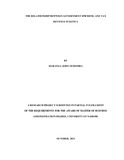| dc.description.abstract | The relationship between government expenditure and government tax revenue is important for fiscal policy making and macroeconomic management. The nature and composition of government expenditure influences economic growth and social welfare. Therefore, government expenditure, which influences national GDP, also influences government tax revenues. Economists have been puzzled by this relationship, specifically, whether it is government expenditure that influences government tax revenue or vice versa. Therefore, the objective of this study was to examine the causal relationship between government expenditure and revenue in Kenya.
The study applied the bound testing approach to cointegration, ARDL the ECM and the causality test. The study tested whether there is unidirectional causality or bidirectional causality between government spending and government taxation.
The results show that there is bidirectional causality from government revenue to government expenditure. Therefore, the results support the fiscal synchronization hypothesis. The results indicated that deviation from the long-term growth rate in government expenditure (revenue) is corrected by approximately 73 percent in the following year.
The policy implication of the results shows that there is a relation between government expenditure and revenue. The government makes its expenditures and revenues decision simultaneously. Therefore, the Treasury should increase revenues and decrease expenditures simultaneously in order to manage the budget deficits. Increasing government expenditure stimulates economic activities, which in turn increase government revenues. In addition, the bidirectional causality between government expenditure and revenues might complicate the government‘s efforts to control the budget deficit. This particularly the case where in an attempt to reduce government expenditure, there is a reduction in government tax revenues. | en |

